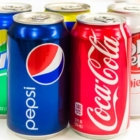A new study published in the journal of the American Heart Association and carried out by a team of researchers from Boston’s University School of Medicine has said that those who consume a can of artificially-sweetened drinks, known as diet soda or soft drinks, are three times more likely to suffer from stroke compared to non-drinkers.
The study notes that by consuming just one can of soft drink a day, the risk of suffering from a deadly stroke.
Also linked to the consumption of soft drink, according to the study, is the risk of developing Alzheimer’s disease.
Before arriving at the conclusion, the study analysed 10 years’ worth of data from a sample of more than 4,300 people.
“Drinking at least one artificially sweetened beverage daily was associated with almost three times the risk of developing stroke or dementia, compared to those who drank artificially sweetened beverages less than once a week,” the research read.
“After adjustments for age, sex, education (for analysis of dementia), calorific intake, diet quality, physical activity and smoking, higher recent and higher cumulative intake of artificially sweetened soft drinks were associated with an increased risk of ischaemic stroke, all-cause dementia and Alzheimer’s disease dementia.”
“To our knowledge, our study is the first to report an association between daily intake of artificially sweetened soft drink and increased risk of both all-cause dementia and dementia because of Alzheimer’s disease,” the co-authors added.
The notion that soft drinks contain substantially minimal quantities of calories because they use artificial sweeteners instead of sugar is misleading; this is because these sweeteners are sometimes thousand times more sweeter than sugar and may lead to weight gain and the risk of developing type 2 diabetes, scientists have argued.
“A lot of people assume they must be healthy choices because they are not sugared beverages, but the critical thing for people to understand is we don’t have the evidence,” Prof. Susan Swithers, from the US’s Purdue University told the BBC.
Typically, the different types of sweeteners used in diet drinks range from Aspartame, Saccharine and Stevia. Aspartame is the sweetener most used in diet drinks, and is also the most controversial.
At 200 times sweeter than sugar, it is used right across the world as a sugar substitute, including cereal, chewing gum and lollies.
“Diet drinks, despite having zero sugar and hardly any calories, actually taste far sweeter than regular soft-drinks,” nutritionist Kristen Beck told news.com.au.
“The problem is that the human brain aren’t set up to be able to deal with the intensely-sweet, zero-calorie version of sweetness that artificial sweeteners provide.”
“Artificial sweeteners provide an intensely sweet taste without any calories which can actually cause you to crave more sweet foods and drinks,” Ms Beck said.
“In turn, the sweetness drive you to eat more kilojoules from sweet foods and drinks than you normally would.
“While sugar signals a positive feeling of reward, artificial sweeteners may not be an effective way to manage a craving for sweets.
“Artificial sweeteners trigger insulin, which sends your body into fat storage mode and leads to weight gain,” Brooke Alpert, author of The Sugar Detox said.
According to Prof. Swithers, ingesting sweeteners also obstructs the way the body deals with real sugar when it’s consumed again.
“We think the diet sodas may be bad because they make it hard to deal with the sugar you are consuming,” she said.
“When the animals get real sugar they’re not as good at processing it, their hormonal responses get blunted, their blood sugar levels go up and it leads to weight gain.”





